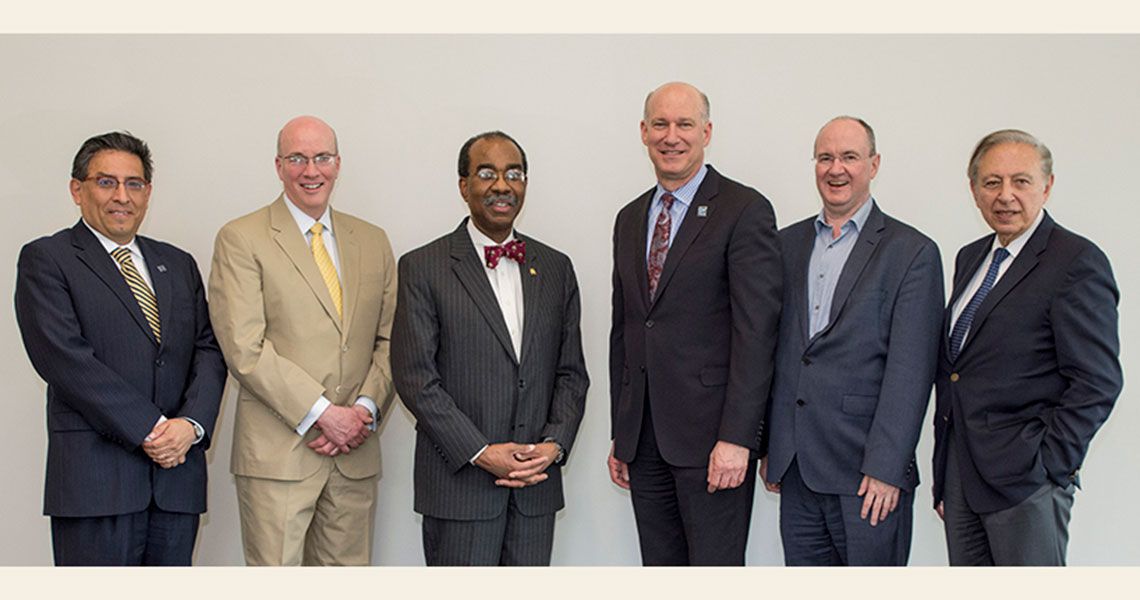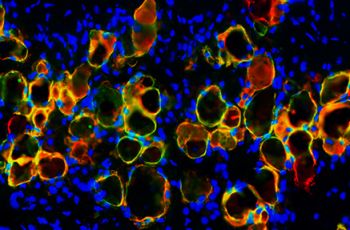Washington, D.C. has many roles: the capital of the country; the epicenter of politics and academia; and for those in the health professions, it’s the focal point of HIV/AIDS, cancer, and health inequity. To improve the District’s health quality, researchers from the GW School of Medicine and Health Sciences (SMHS) and the Milken Institute School of Public Health (Milken SPH), along with leaders from the National Institutes of Health (NIH) and the Institute of Human Virology at the University of Maryland School of Medicine, united their efforts at the inaugural Scientific Symposium on Viruses and Cancer, held April 19 and 20 on the GW campus.
“This [symposium] is a 30-year dream, really, that since the beginning of the HIV [epidemic], Washington would be a destination city where we could attract talent, where we would be doing studies that the rest of the country, the rest of the world, would be looking at,” said Henry Masur, M.D., chief of the Critical Care Medicine Department at the NIH Clinical Center and clinical professor of medicine at SMHS, during his introductory remarks.
As Masur explained, the last decade has been transformative for D.C., particularly with HIV/AIDS clinical care and research. Although D.C. has the highest incidence of the disease in the country, researchers – including Alan Greenberg, M.D. ’82, M.P.H., chair and professor of the Department of Epidemiology and Biostatistics at Milken SPH – have made significant strides to address the crisis. In 2009, new cases numbered more than 900, but today, Masur estimates that number to be closer to 400. D.C. also has a robust prevention program and boasts one of the largest cohorts – 13 of the area’s largest providers working with the D.C. Department of Health database – that has helped to significantly decrease D.C.’s HIV rate.
“If you look at the number of people living with HIV – 16,000 – and you compare that to the number of deaths we’ve had and new cases, you can see that we’re providing better care for patients, we’re reducing transmission,” Masur said. “This is a major benefit that all of these collaborations, all this research, is providing to this city.”
For Jeffrey S. Akman, M.D. ’81, RESD ’85, vice president of health affairs, Walter A. Bloedorn Professor of Administrative Medicine, and dean of SMHS, Washington, D.C. has been “Ground Zero” for HIV/AIDS.
“I’ve been involved in HIV work since the early ’80s,” Akman said on the first day of the symposium. “I was a resident beginning to see patients with HIV back in the ’80s. Many of my friends were dying, many of my patients were dying, and it was a very heady time.”
When he joined the GW faculty, and eventually became dean, Akman prioritized research, recruiting basic scientists like Douglas Nixon, M.D., Ph.D., professor and chair of the Department of Microbiology, Immunology, and Tropical Medicine and Walter G. Ross Professor of Basic Science Research at SMHS. Akman also became a member of the President’s Advisory Council for HIV/AIDS, or PACHA. Additionally, this year, a consortium of nearly 200 academic HIV investigators from three GW schools, including SMHS and Milken SPH, along with the Columbian College of Arts and Sciences, and five major D.C. research institutions received an NIH grant to fund the newly established District of Columbia Center for AIDS Research (DC CFAR).
It’s this kind of collaboration that Akman and Masur are hoping will fuel continued progress, not only with HIV/AIDS, but also with other viruses and cancer.
“It’s not just HIV; it’s pretty much every illness: it’s breast cancer, it’s renal disease, it’s hypertension, it’s obesity. Our health disparities are off the charts in D.C.,” said Akman.
Robert C. Gallo, M.D., The Homer and Martha Gudelsky Distinguished Professor in Medicine and director of the Institute of Human Virology at the University of Maryland School of Medicine, has the same vision. He initially proposed a domestic version of the PEPFAR, the President’s Emergency Plan for AIDS Relief, in 2008, with D.C. and Baltimore as sites for pilot studies, but interest wasn’t vigorous. When Akman became dean of SMHS, however, Gallo – through a mutual acquaintance – found that Akman and the university were receptive to collaboration.
“That’s what really fired this [idea of the symposium] up,” Gallo said.
Gallo subsequently learned that GW had high-caliber researchers on staff – like Nixon and Eduardo M. Sotomayor, M.D., director of the GW Cancer Center and professor of medicine at SMHS – and the idea of the symposium cemented.
Sotomayor, Gallo explained, is well-known for his expertise in lymphomas, which can accompany HIV. With those at the forefront of research, like Sotomayor and Nixon, sharing results and ideas, the possibility for making a greater impact on viruses and cancer grows exponentially.
“There is a potential for a number of bridges,” Gallo said.
So, over the course of the two days, researchers presented their work. Nixon, for example, discussed “Immune Targeting of the Latent Reservoir,” while Sotomayor spoke about “Targeting Therapies for Lymphoma.” Other topics included global and domestic HIV prevention and HIV research, as well as cancer.



